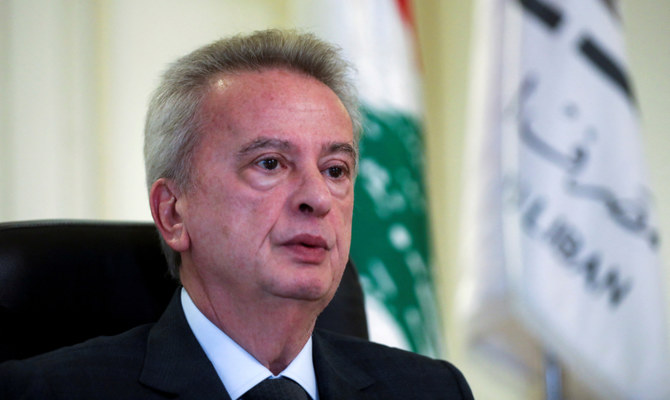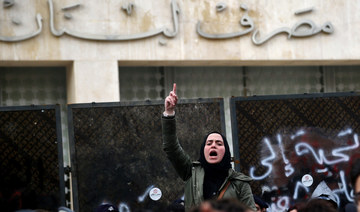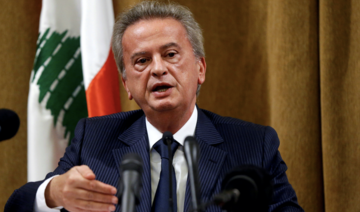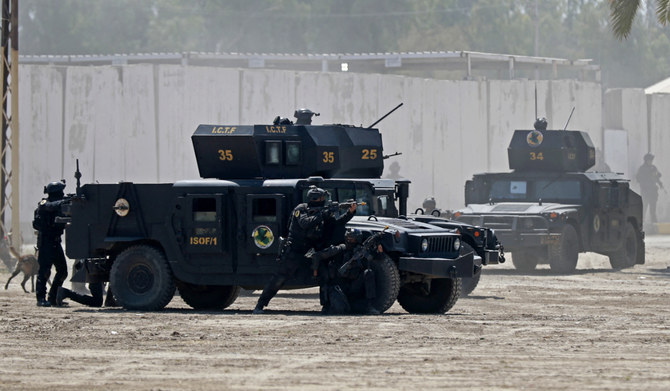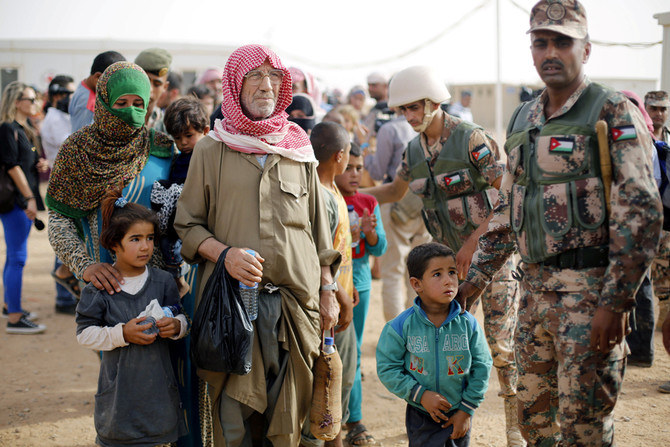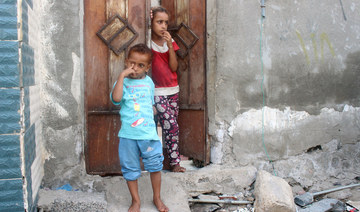BEIRUT: Judge Ghada Aoun, the state prosecutor of Mount Lebanon, indefinitely extended on Tuesday a subpoena issued earlier this month for Banque du Liban Gov. Riad Salameh after he failed to appear at a hearing.
Aoun has sought to interrogate Salameh as a witness in several cases alleging financial impropriety.
The subpoena is related to a criminal lawsuit filed against Salameh by a group called “The People Want to Reform the System” who accuse the governor of “illegal enrichment,” “money laundering,” and “wasting public funds.”
Lebanese State Security personnel sent to the central bank’s headquarters in Ras Beirut and to Salameh’s house in Rabieh were denied entry by members of the Internal Security Forces.
It was the fourth hearing set by Aoun, who is affiliated to the Free Patriotic Movement, to question Salameh, who did not attend under the pretext that he had previously submitted a request to have Aoun removed from the case.
Salameh’s nearly three decades at the helm of the central bank have come under increased scrutiny since the country’s financial meltdown in 2019.
He is being investigated in Lebanon and several European country’s, including Switzerland, for alleged money laundering and embezzlement of hundreds of millions of dollars at the BDL — allegations he has repeatedly denied.
In a TV statement, Aoun said she “will keep prosecuting BDL Gov. Riad Salameh until he is brought to justice.”
The group that filed the lawsuit against Salameh accused Maj.-Gen. Imad Othman, director general of the Internal Security Forces, of “violating the law by protecting the governor, and rebelling against the judicial order issued against him.”
It added that “the state security agents are responsible for the execution of the summons. However, Maj-Gen. Othman, his officers and his generals have committed a cold-blooded crime that automatically deprives them of any functional immunity.”
The group, which includes a number of lawyers active in the civil movement, said they decided to “lodge a personal lawsuit against Othman and his agents, who have confronted the security of the state.”
A judicial source told Arab News: “Judge Aoun is the one violating the laws. The public prosecutor at the Court of Cassation, Judge Ghassan Oueidat, had previously removed her from cases related to important financial crimes, referring them to judicial inspection last April. However, no decision has been taken yet because of the difficulty of voting within this body due to political interference.”
The judicial source clarified that “Judge Aoun violates the law by issuing a subpoena against the BDL governor, as he is not a defendant but a witness. How does she give herself the right to issue a subpoena against him? Salameh’s representatives had previously submitted a request to have Aoun removed from the case, but she refused to receive the request.”
According to the source, Aoun cannot issue a subpoena in absentia against Salameh, and can only postpone the hearing.
The act of sending the State Security to places where Salameh might be found caused widespread shock in the Palace of Justice in Beirut.
The internal dispute over the BDL governor is intense between the political party of President Michel Aoun, who is trying to overthrow Salameh, and his backers.
Salameh’s camp is of the view that “Judge Aoun’s move … reflects a political decision to replace the governor with someone affiliated to the president.”
Prime Minister Najib Mikati, though, wants the veteran central bank chief to remain in his post while Lebanon battles its economic crisis.
Judge Aoun issued a decision to freeze all the governor’s properties and cars on Jan. 18, and imposed a travel ban on him.
The governor has been the target of a political and popular campaign against him since protests broke out in 2019 following the start of Lebanon’s economic collapse, holding him accountable for seizing people’s deposits in banks and lending to the state.
The governor, however, insists that he is working to “protect the social security of the Lebanese people and to secure their minimal needs in spite of the financial situation.”
He has said that “the problem will be solved when the parties concerned assume their responsibilities instead of holding the central bank accountable for the crises.”
Meanwhile, as political tensions rise, Hezbollah challenged the decision of the Ministry of Interior to ban the activity of a prohibited Bahraini group on Monday.
Interior Minister Bassam Mawlawi, after consulting Mikati, sent two notices last weekend to the Directorate General of Internal Security Forces and the Directorate General of Public Security to prevent two activities on Feb. 14 and 15, held by “Al-Wefaq National Islamic Society” and the “Coalition of 14 February Youth.”
The notices were sent for “failure to obtain legal authorization” and asked to “take all the necessary investigative measures to collect information about organizers, advocates and invitees.”
Neither security organization carried out the order, however.



